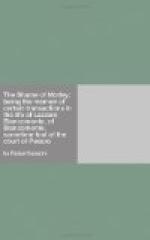To that I answered nothing, but urged him to go below and show himself; and the better that he might bear himself among his courtiers, I detailed to him the most salient features of that fight.
He went, not without a certain uneasiness which, however, was soon dispelled by the thunder of acclamation with which he was received; not only by his courtiers, but by the soldiers who had fought in that hot skirmish, and who believed that it was he had led them.
Meanwhile I sat above, in the closet he had vacated, and thence I watched him, with such mingling feelings in my heart as baffle now my halting pen. Scorn there was in my mood and a hot contempt of him that he could stand there and accept their acclamation with an air of humility that I am persuaded was assumed: a certain envious anger was there, too, to think that such a weak-kneed, lily-livered craven should receive the plaudits of the deeds that I, his buffoon, had performed for him. Those acclamations were not for him, although those who acclaimed him thought so. They were for the man who had routed Ramiro del’ Orca and his followers, and that man assuredly was I. Yet there I crouched above, behind the velvet curtains where none might see me, whilst he stood smiling and toying with his brown beard and listening to the fine words of praise that, I could imagine, were falling from the lips of Madonna Paola, who had drawn near and was speaking to him.
There is in my nature a certain love of effectiveness, a certain taste for theatrical parade and the contriving of odd situations. This bent of mine was whispering to me then to throw wide the window, and, stemming their noisy plaudits, announce to them the truth of what had passed. Yet what if I had done so? They would have accounted it but a new jest of Boccadoro, the Fool, and one so ill-conceived that they might urge the Lord Giovanni to have him whipped for it.
Aye, it would have been a folly, a futile act that would have earned me unbelief, contempt and anger. And yet there was a moment when jealousy urged me almost headlong to that rashness. For in Madonna Paola’s eyes there was a new expression as they rested on the face of Giovanni Sforza— an expression that told me she had come to love this man whom a little while ago she had despised.
God! was there ever such an irony? Was there ever such a paradox? She loved him, and yet it was not him she loved. The man she loved was the man who had shown the qualities of his mind in the verses with which the Court was ringing; the man who had that morning given proof of his high mettle and knightly prowess by the deeds of arms he had performed. I was that man—not he at whom so adoringly she looked. And so—I argued, in my warped way and with the philosophy worthy of a Fool—it was I whom she loved, and Giovanni was but the symbol that stood for me. He represented the songs and the deeds that were mine.




